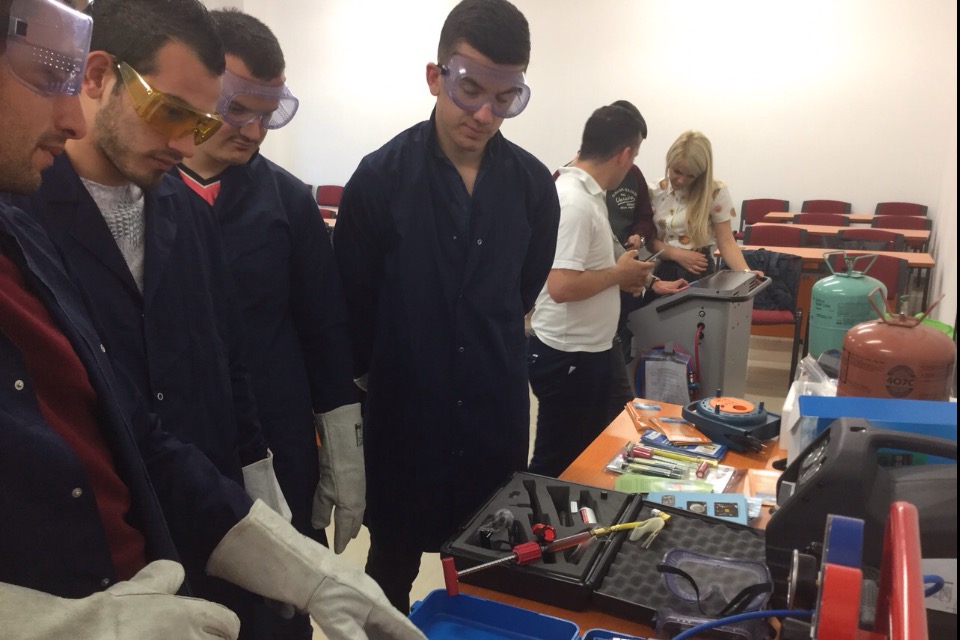
USA: Two seafood processing and cold storage companies are to pay $495,000 in penalties for violations of laws relating to the management of ozone-depleting refrigerant R22.
In a settlement announced yesterday by the Environmental Protection Agency and Department of Justice, Ocean Gold Seafoods Inc and Ocean Cold LLC will pay $495,000 in penalties for violations of the federal Clean Air Act and Emergency Planning and Community Right-to-Know Act.
According to the US Environmental Protection Agency, the two companies failed to promptly repair R22 refrigerant leaks and failed to keep adequate records of equipment servicing at their facilities in Westport, Washington.
“Because of this settlement, the Ocean Companies are expected to cut their future ozone-depleting releases and reduce their future refrigerant emissions in an amount equivalent to approximately 47 million pounds [approximately 21,320 tonnes] of carbon dioxide each year, another step in our efforts to combat climate change,” said director Ed Kowalski of EPA’s Pacific Northwest Office of Compliance and Enforcement.
“Investing in better equipment and maintenance to stop wasteful refrigerant leaks is good for our environment and good for business,” he added.
Since at least 2007, the Ocean Companies are said to have failed to promptly repair refrigerant leaks and failed to keep adequate records of the servicing of their refrigeration equipment necessary to prevent leaks, in violation of the Clean Air Act. The companies also failed to provide timely release reports to EPA and emergency planners, in violation of the Emergency Planning and Community Right-to-Know Act.
Ocean Gold Seafoods Inc operates a seafood processing facility located in Westport, Washington. It also operates a separate ice manufacturing facility located on the Point Chehalis dock in Westport, under a joint use agreement with an unrelated entity.
Ocean Cold LLC is a wholly owned subsidiary of Ocean Gold and owns and operates a cold storage facility, also in Westport, Washington.
Under US Federal law, owners and operators of industrial process refrigeration equipment containing more than 50lb (22.7kg) of refrigerant must have leaks repaired if the leak rate of the appliance exceeds 35% per year. Any repairs must bring the leak rate to below 35%.
The Ocean Gold and Ocean Cold refrigeration systems were each said to have had a full charge of at least 10,000lb (4.5 tonnes) of R22. It is alleged that no leak-rate calculations were carried out at the Ocean Gold facility when adding R22 to that system and neither plant had any certified, self-contained recovery equipment until April 2011.
Ocean Gold’s icehouse facility had a full charge of at least 4,000lb (1.8 tonnes) of R22. Again, it is alleged that Ocean Gold did not perform leak-rate calculations when adding R22 to the system.
The settlement requires the Ocean companies to commit to a refrigerant release reduction programme, to implement a refrigerant compliance management plan, to train employees in their refrigerant-related work requirements, and to provide periodic reports to EPA. The companies also agreed to use a third-party verifier to inspect their facilities and records to observe leak detection and record-keeping practices, as well as to determine whether the companies’ actions and records comply with the management plan and the terms of the settlement.
In addition to the penalties, as part of the settlement, the Ocean Companies have agreed to fix all refrigerant leaks and implement facility-wide improvements expected to cost about $260,000.
The proposed settlement is subject to a 30-day public comment period and final court approval.

 USA: Two seafood processing and cold storage companies are to pay $495,000 in penalties for violations of laws relating to the management of ozone-depleting refrigerant R22.
In a settlement announced yesterday by the Environmental Protection Agency and Department of Justice, Ocean Gold Seafoods Inc and Ocean Cold LLC will pay $495,000 in penalties for violations of the federal Clean Air Act and Emergency Planning and Community Right-to-Know Act.
According to the US Environmental Protection Agency, the two companies failed to promptly repair R22 refrigerant leaks and failed to keep adequate records of equipment servicing at their facilities in Westport, Washington.
“Because of this settlement, the Ocean Companies are expected to cut their future ozone-depleting releases and reduce their future refrigerant emissions in an amount equivalent to approximately 47 million pounds [approximately 21,320 tonnes] of carbon dioxide each year, another step in our efforts to combat climate change,” said director Ed Kowalski of EPA’s Pacific Northwest Office of Compliance and Enforcement.
“Investing in better equipment and maintenance to stop wasteful refrigerant leaks is good for our environment and good for business,” he added.
Since at least 2007, the Ocean Companies are said to have failed to promptly repair refrigerant leaks and failed to keep adequate records of the servicing of their refrigeration equipment necessary to prevent leaks, in violation of the Clean Air Act. The companies also failed to provide timely release reports to EPA and emergency planners, in violation of the Emergency Planning and Community Right-to-Know Act.
Ocean Gold Seafoods Inc operates a seafood processing facility located in Westport, Washington. It also operates a separate ice manufacturing facility located on the Point Chehalis dock in Westport, under a joint use agreement with an unrelated entity.
Ocean Cold LLC is a wholly owned subsidiary of Ocean Gold and owns and operates a cold storage facility, also in Westport, Washington.
Under US Federal law, owners and operators of industrial process refrigeration equipment containing more than 50lb (22.7kg) of refrigerant must have leaks repaired if the leak rate of the appliance exceeds 35% per year. Any repairs must bring the leak rate to below 35%.
The Ocean Gold and Ocean Cold refrigeration systems were each said to have had a full charge of at least 10,000lb (4.5 tonnes) of R22. It is alleged that no leak-rate calculations were carried out at the Ocean Gold facility when adding R22 to that system and neither plant had any certified, self-contained recovery equipment until April 2011.
Ocean Gold’s icehouse facility had a full charge of at least 4,000lb (1.8 tonnes) of R22. Again, it is alleged that Ocean Gold did not perform leak-rate calculations when adding R22 to the system.
The settlement requires the Ocean companies to commit to a refrigerant release reduction programme, to implement a refrigerant compliance management plan, to train employees in their refrigerant-related work requirements, and to provide periodic reports to EPA. The companies also agreed to use a third-party verifier to inspect their facilities and records to observe leak detection and record-keeping practices, as well as to determine whether the companies’ actions and records comply with the management plan and the terms of the settlement.
In addition to the penalties, as part of the settlement, the Ocean Companies have agreed to fix all refrigerant leaks and implement facility-wide improvements expected to cost about $260,000.
The proposed settlement is subject to a 30-day public comment period and final court approval.
USA: Two seafood processing and cold storage companies are to pay $495,000 in penalties for violations of laws relating to the management of ozone-depleting refrigerant R22.
In a settlement announced yesterday by the Environmental Protection Agency and Department of Justice, Ocean Gold Seafoods Inc and Ocean Cold LLC will pay $495,000 in penalties for violations of the federal Clean Air Act and Emergency Planning and Community Right-to-Know Act.
According to the US Environmental Protection Agency, the two companies failed to promptly repair R22 refrigerant leaks and failed to keep adequate records of equipment servicing at their facilities in Westport, Washington.
“Because of this settlement, the Ocean Companies are expected to cut their future ozone-depleting releases and reduce their future refrigerant emissions in an amount equivalent to approximately 47 million pounds [approximately 21,320 tonnes] of carbon dioxide each year, another step in our efforts to combat climate change,” said director Ed Kowalski of EPA’s Pacific Northwest Office of Compliance and Enforcement.
“Investing in better equipment and maintenance to stop wasteful refrigerant leaks is good for our environment and good for business,” he added.
Since at least 2007, the Ocean Companies are said to have failed to promptly repair refrigerant leaks and failed to keep adequate records of the servicing of their refrigeration equipment necessary to prevent leaks, in violation of the Clean Air Act. The companies also failed to provide timely release reports to EPA and emergency planners, in violation of the Emergency Planning and Community Right-to-Know Act.
Ocean Gold Seafoods Inc operates a seafood processing facility located in Westport, Washington. It also operates a separate ice manufacturing facility located on the Point Chehalis dock in Westport, under a joint use agreement with an unrelated entity.
Ocean Cold LLC is a wholly owned subsidiary of Ocean Gold and owns and operates a cold storage facility, also in Westport, Washington.
Under US Federal law, owners and operators of industrial process refrigeration equipment containing more than 50lb (22.7kg) of refrigerant must have leaks repaired if the leak rate of the appliance exceeds 35% per year. Any repairs must bring the leak rate to below 35%.
The Ocean Gold and Ocean Cold refrigeration systems were each said to have had a full charge of at least 10,000lb (4.5 tonnes) of R22. It is alleged that no leak-rate calculations were carried out at the Ocean Gold facility when adding R22 to that system and neither plant had any certified, self-contained recovery equipment until April 2011.
Ocean Gold’s icehouse facility had a full charge of at least 4,000lb (1.8 tonnes) of R22. Again, it is alleged that Ocean Gold did not perform leak-rate calculations when adding R22 to the system.
The settlement requires the Ocean companies to commit to a refrigerant release reduction programme, to implement a refrigerant compliance management plan, to train employees in their refrigerant-related work requirements, and to provide periodic reports to EPA. The companies also agreed to use a third-party verifier to inspect their facilities and records to observe leak detection and record-keeping practices, as well as to determine whether the companies’ actions and records comply with the management plan and the terms of the settlement.
In addition to the penalties, as part of the settlement, the Ocean Companies have agreed to fix all refrigerant leaks and implement facility-wide improvements expected to cost about $260,000.
The proposed settlement is subject to a 30-day public comment period and final court approval.
